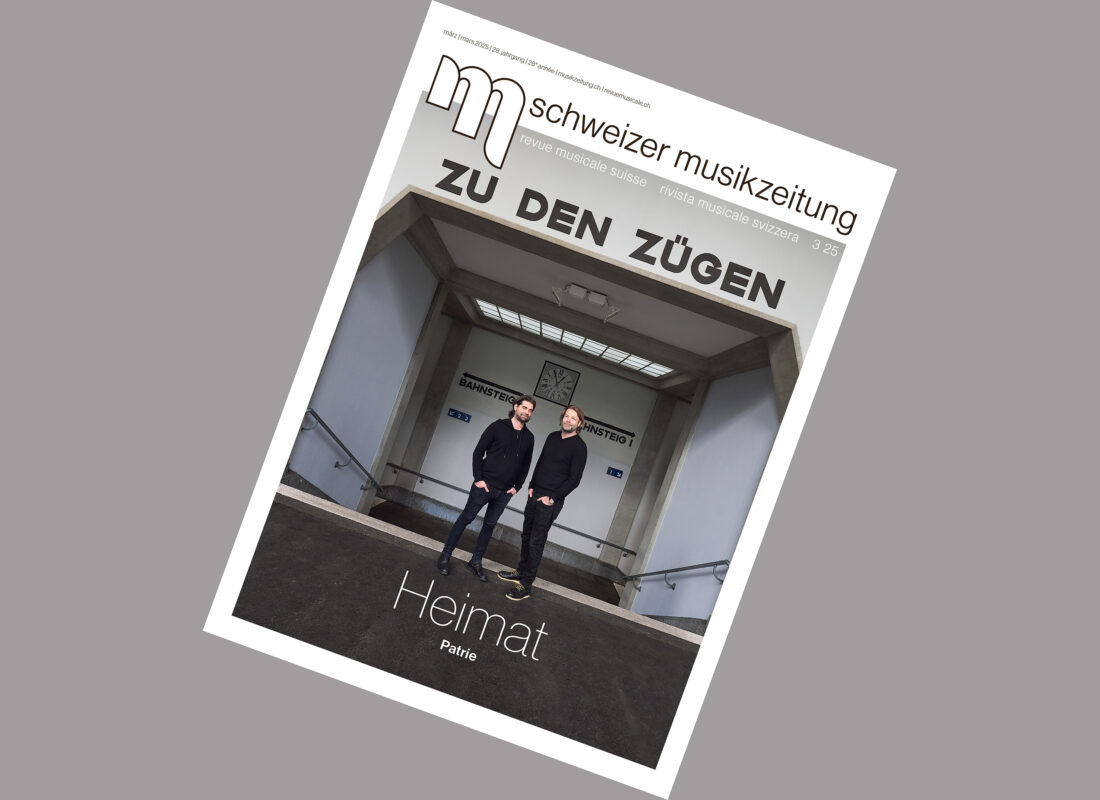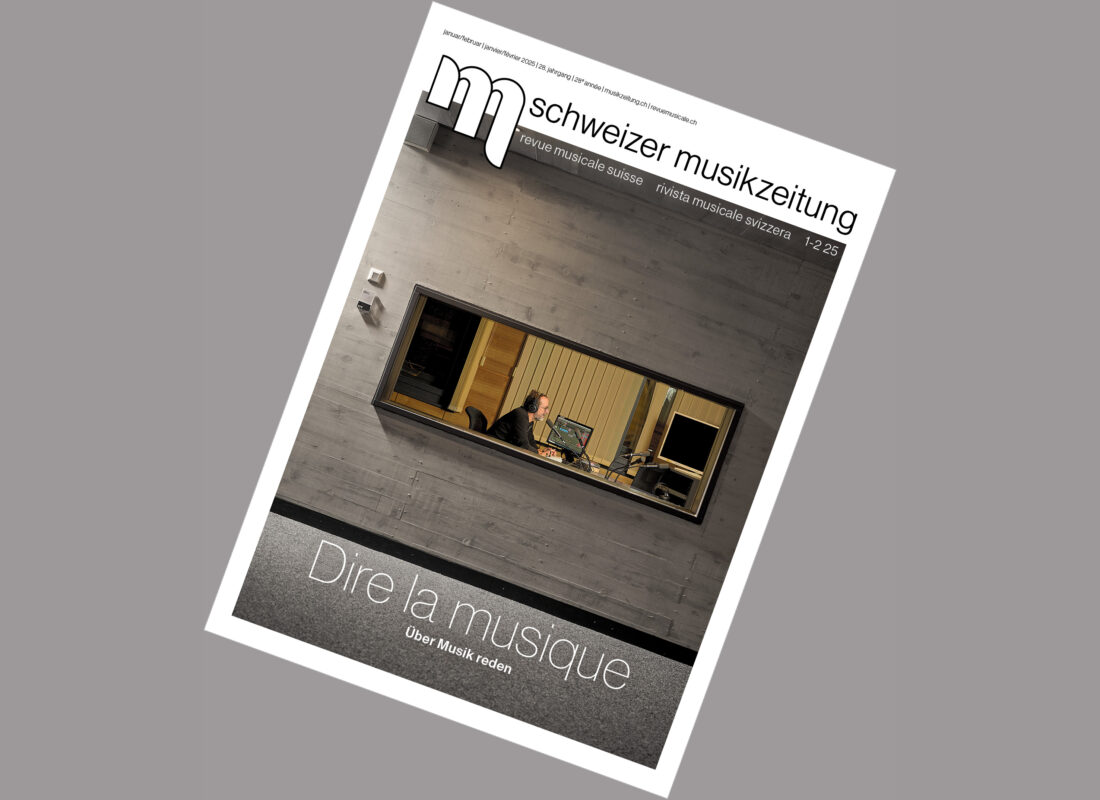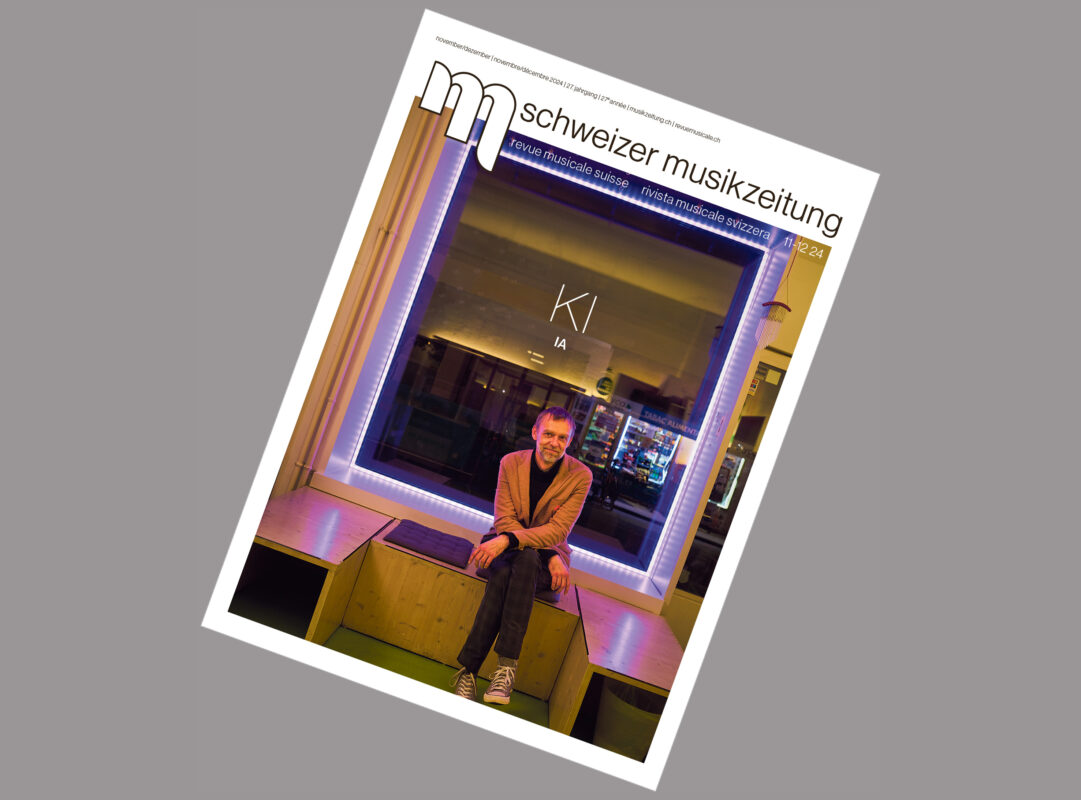Welcome home
For him, Switzerland has always been Central Europe, just like his native Austria. The composer Georg Friedrich Haas in conversation.


For him, Switzerland has always been Central Europe, just like his native Austria. The composer Georg Friedrich Haas in conversation.
Georg Friedrich Haas spent his childhood in a small town in Vorarlberg, Austria's westernmost province. If you study the outline of Central Europe, you might think that Vorarlberg and Tyrol extend into Switzerland like the trunk of an elephant, between Germany and Italy, with Vorarlberg representing the tip of the trunk. This image may seem strange, and yet it lends itself as an analogy for the location of this western Vorarlberg town called Tschagguns: The trunk is a flexible organ gifted with a sensitive sense of touch, which the elephant uses for social interaction with the other elephants. - An Alemannic language is spoken in Tschagguns, while the majority of Austria belongs to the Bavarian language area. In addition, the village lies directly on the national border that runs over the mountain ridges of the Rätikon, and thirdly, the watershed between the Rhine and Danube river basins runs to the east of this village. Tschagguns is therefore located in the catchment area of the Rhine, while Austria is largely part of the Danube catchment area. This also explains why the cardinal point "east" does not imply distance and cultural difference in our context. When asked whether he would be prepared to discuss the SMZ issue on the subject of "East", Georg Friedrich Haas said that, from the opposite perspective, he would never have thought of Switzerland when talking about "West", but he would have thought of France, Ireland, the USA and Canada. And he added: "For me, Switzerland was always Central Europe. Just like Austria."
"I never really had the feeling that Switzerland is something completely different. There are certain differences, of course. Even back then, when we drove across the border into Switzerland, I noticed that the villages on the slopes were much higher up than in Austria." Words such as "growth" and "prosperity" come up in our conversation, terms that have been used to describe many things since February 9. Even though Georg Friedrich Haas has not lived in Basel since last summer, where he worked as a professor of composition from 2005 to 2013, he is a keen observer of local political events. In September of last year, he accepted a composition professorship at Columbia University in New York, succeeding Tristan Murail. So it's no longer just a distance of eight kilometers to Switzerland, but well over 6,000. We hadn't planned to talk about politics, but it was a topic that suggested itself to us. Haas deeply regrets that the consequences of the referendum result are now being felt first in the Erasmus funds, of all things. "Presumably very few of the Swiss who are personally affected by the Erasmus project voted 'yes' in this referendum. What is most urgently needed, namely the promotion of international relations at a high intellectual level, is the first thing to be cut. You can see how wrongly the tools are working."
"There is no musical language for something like this"
You can hear from his words that his life as a human being forms an inseparable unit with that of the musician. We come to in vain ("in vain"), a one-hour work for 24 instruments, which Simon Rattle has described as "one of the great masterpieces of the 21st century". With this music, Haas reacted to the rise of the political right in Austria at the end of the 20th century. In 1999, in the course of the national elections, a party (FPÖ) came to power whose leader, Haider, had already been the subject of fierce criticism at home and abroad for over a decade due to his sometimes extremely right-wing populist slogans and tongue-in-cheek, unclean handling of the Nazi past. All EU member states at the time, as well as Canada, Israel and Norway, temporarily put their political contacts with Austria's black-blue government on hold. Such measures, which were referred to as "sanctions", were of course not directed against Austria as a whole, but were limited to dealings between governments. Paradoxically, however, they had the effect that many people who had previously been very skeptical of the black-blue coalition suddenly showed solidarity with it. The composer comments that Haider probably deliberately provoked the EU. The politician needed these sanctions, this external pressure on Austria, in order to achieve an effect of solidarity within the state. Does this sound like a warning regarding diplomatic relations between the EU and Switzerland? Perhaps. In any case, this is by no means a proclamation of schoolmasterly certainties or even political ideologies, but rather the seismographic observations of a sensitive musician who would never place his compositional work directly at the service of politics and who has the privilege of taking a public stand from the freedom and independence of an intellectual.
"I am a politically active person. Accordingly, I have also tried to incorporate my political awareness into art, but I have come to understand more and more that this does not work and I believe that with in vain this contrast is particularly strong: the theme of in vain is not specifically the participation in government of an Austrian party with a problematic relationship to the Nazi past. You can't make music out of that. You can write lyrics, you can protest, but you can't make music. Make music - no, made I'm talking about the despair that things you thought you had overcome are back. The musical catastrophe of in vain is the fact that there is a reprise: At the end of the piece after a process that lasts almost an hour, you are back where you were at the beginning. From my political point of view, I would criticize that the musical material that I want to overcome and which then returns is far too beautiful to be suitable as a symbol for these repugnant political events. For the people who came to power back then, even a general pause would be too beautiful! There is no musical language for something like that. Thirteen years have passed since I started working on this piece. After that, I stopped making concrete music out of a political consciousness. In addition, the possibility of political participation is severely limited when you live abroad."
View of Switzerland

- Photo: © Universal Edition, Eric Marinitsch
But Haas looks back on his Swiss years with pleasure: "The Basel University of Music is a wonderful place," he enthuses. "The intensive collaboration between instrumental training and the performance practice of new and contemporary music is unique. In general, I am fascinated by the way in which the art of the 20th century is part of the general consciousness in Switzerland. Take a look at the banknotes: Arthur Honegger! Imagine if Gustav Mahler was depicted on an Austrian banknote." He laughs and remarks: "I don't want to go so far as to wish for Anton Webern."
We come back to our actual topic: after moving to Switzerland at the latest, he noticed a fundamental difference to Austria, namely whether a country has a centuries-long democratic tradition or a centuries-long monarchist one. The composer talks about the divergent perspectives of the two Alpine countries and Austria's connection to the east, to Hungary, the Czech Republic and Slovenia. In 1918, Austria would have had the chance to become multilingual along the lines of Switzerland, says the composer. But at the time, the decision was made to be "German-Austria" and to force those who had a different mother tongue to assimilate. The fact that a multilingualism analogous to Switzerland did not prevail in Austria is "a tragedy within Austrian history."
Georg Friedrich Haas has been living and working in New York for several months now, but he is always heading "East". Here's an anecdote full of meaning: "When I left the USA on my work visa for the first time and then re-entered, the immigration officer at the airport with the words: "Welcome home. Imagine that in Switzerland!" Thoughtful silence. He was back in Europe just a few days ago for the premiere of his concerto grosso No. 1 for four alphorns and orchestra, performed by the musicians of the hornroh modern alphorn quartet, known far beyond Switzerland, and the Bavarian Radio Symphony Orchestra conducted by Susanna Mälkki. The work explores in a fascinating way the tension between the intonation possibilities of the alphorns and those of a large symphony orchestra. According to Haas, he had no associations with Switzerland in this context. "I love the intonation possibilities of these instruments, which are used, so to speak, as masters of intonation in overtone harmony. I am delighted that instruments with a connotation 'below high culture' are literally setting the tone in the tradition-laden Herkulessaal in Munich and later in the Golden Hall of the Vienna Musikverein."
Listening to Georg Friedrich Haas' music
Radio
The recorded Munich premiere of the concerto grosso No. 1 will be broadcast on Tuesday, April 8, 2014 at 8:03 pm on BR-KLASSIK.
Concert
August 27, 2014, 7 pm, Grange aux Concerts Cernier, as part of the Swiss Festival of Musicians
Georg Friedrich Haas: Double concerto for accordion, viola and chamber ensemble; In nomine for ensemble
Katharina Rosenberger: shift for ensemble
Fanny Vicens (accordion), Anna Spina (viola), Nouvel Ensemble Contemporain, Pierre-Alain Monot
April 22/23, 2015, Tonhalle Zurich, Great Hall
Georg Friedrich Haas: concerto grosso No. 1 for four alphorns and orchestra, Swiss premiere
Anton Bruckner: Symphony No. 6Tonhalle Orchestra Zurich, Kent Nagano (conductor), HORNROH modern alphorn quartet








